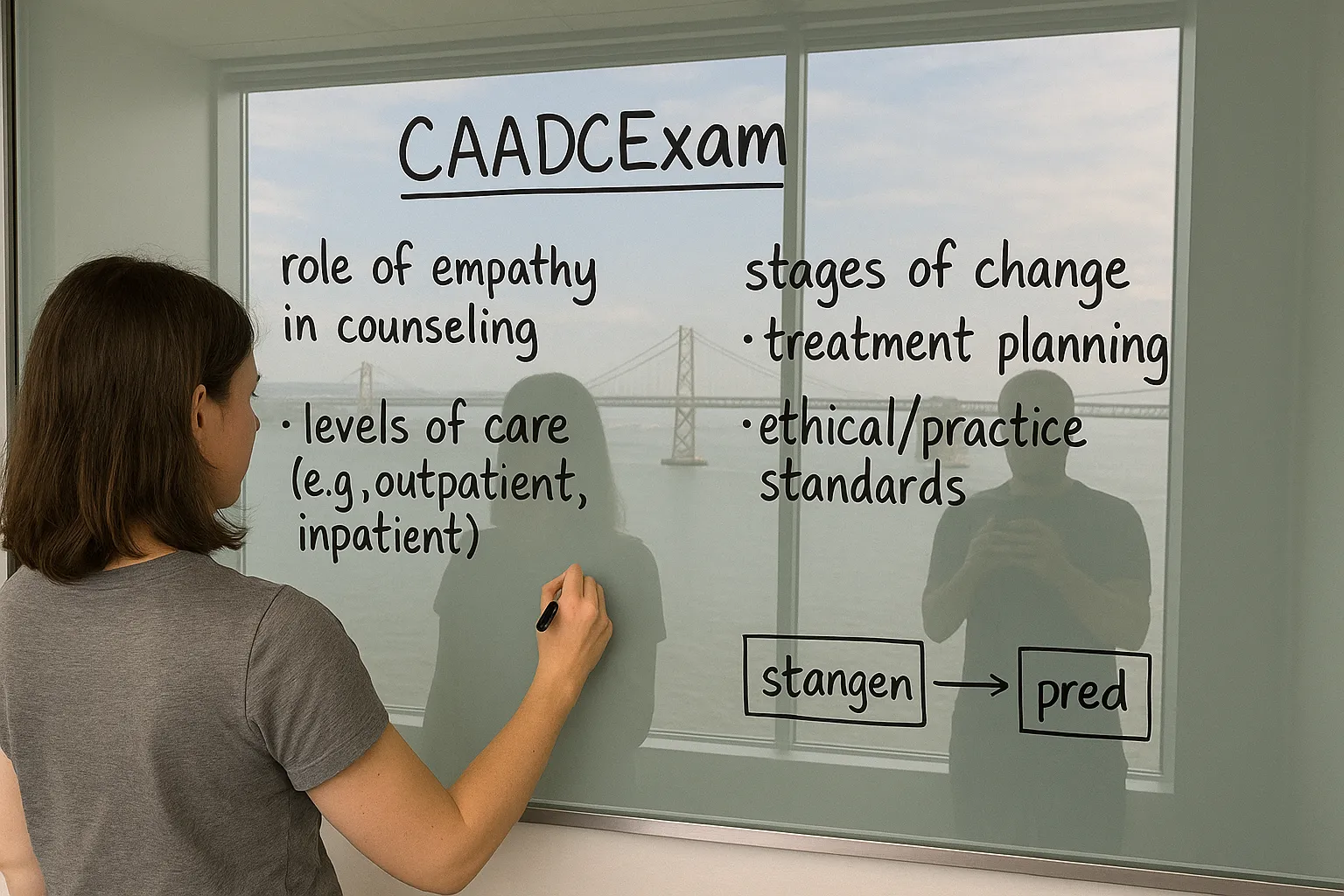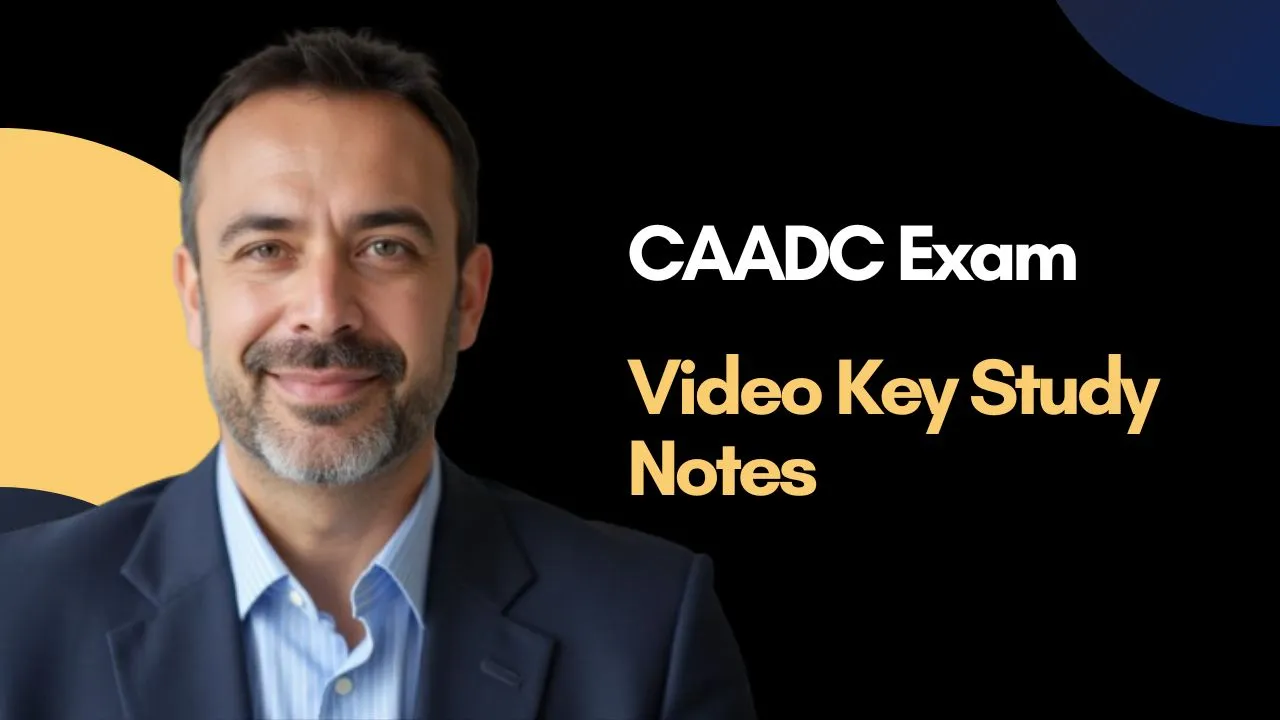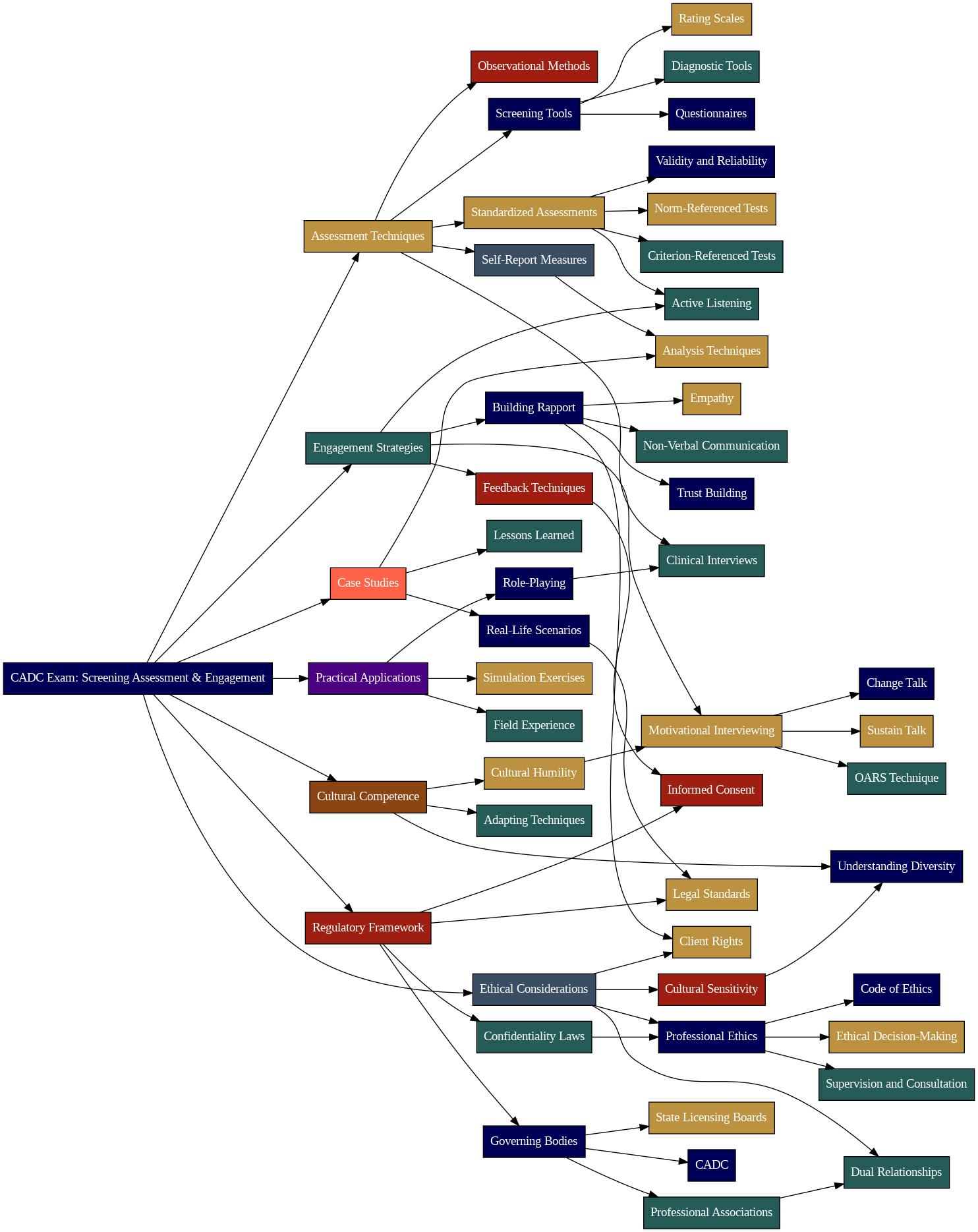Quiz-summary
0 of 30 questions completed
Questions:
- 1
- 2
- 3
- 4
- 5
- 6
- 7
- 8
- 9
- 10
- 11
- 12
- 13
- 14
- 15
- 16
- 17
- 18
- 19
- 20
- 21
- 22
- 23
- 24
- 25
- 26
- 27
- 28
- 29
- 30
Information
Premium Practice Questions
You have already completed the quiz before. Hence you can not start it again.
Quiz is loading...
You must sign in or sign up to start the quiz.
You have to finish following quiz, to start this quiz:
Results
0 of 30 questions answered correctly
Your time:
Time has elapsed
Categories
- Not categorized 0%
- 1
- 2
- 3
- 4
- 5
- 6
- 7
- 8
- 9
- 10
- 11
- 12
- 13
- 14
- 15
- 16
- 17
- 18
- 19
- 20
- 21
- 22
- 23
- 24
- 25
- 26
- 27
- 28
- 29
- 30
- Answered
- Review
-
Question 1 of 30
1. Question
A Licensed Addiction Counselor (LAC) in Louisiana is working with a client who discloses past child abuse perpetrated by a family member who no longer has contact with the client or any children. Louisiana law mandates reporting of suspected child abuse. The client is now an adult and the perpetrator poses no current threat. What is the LAC’s MOST ETHICALLY sound course of action?
Correct
Louisiana LACs are bound by both state regulations and the ethical guidelines of their professional organizations. When faced with an ethical dilemma, a counselor must first consult the relevant Louisiana statutes, such as those pertaining to confidentiality and mandated reporting. Simultaneously, they should refer to the ethical codes of organizations like the American Counseling Association (ACA) or the National Association of Alcohol and Drug Abuse Counselors (NAADAC). If a conflict arises between the law and ethical guidelines, counselors should generally adhere to the law, while also seeking to resolve the ethical conflict in a way that upholds the client’s best interests and the integrity of the profession. Consultation with supervisors, colleagues, or legal counsel is crucial in navigating such complex situations. Furthermore, documentation of the decision-making process is essential for accountability. The scenario highlights the tension between legal obligations (reporting suspected child abuse) and ethical considerations (maintaining client confidentiality), requiring the counselor to prioritize the safety and well-being of a potentially vulnerable minor while respecting the client’s rights to the greatest extent possible within the legal framework of Louisiana.
Incorrect
Louisiana LACs are bound by both state regulations and the ethical guidelines of their professional organizations. When faced with an ethical dilemma, a counselor must first consult the relevant Louisiana statutes, such as those pertaining to confidentiality and mandated reporting. Simultaneously, they should refer to the ethical codes of organizations like the American Counseling Association (ACA) or the National Association of Alcohol and Drug Abuse Counselors (NAADAC). If a conflict arises between the law and ethical guidelines, counselors should generally adhere to the law, while also seeking to resolve the ethical conflict in a way that upholds the client’s best interests and the integrity of the profession. Consultation with supervisors, colleagues, or legal counsel is crucial in navigating such complex situations. Furthermore, documentation of the decision-making process is essential for accountability. The scenario highlights the tension between legal obligations (reporting suspected child abuse) and ethical considerations (maintaining client confidentiality), requiring the counselor to prioritize the safety and well-being of a potentially vulnerable minor while respecting the client’s rights to the greatest extent possible within the legal framework of Louisiana.
-
Question 2 of 30
2. Question
An LAC in Louisiana encounters a client, Shanice, who is interested in exploring the use of a novel mobile app designed to support relapse prevention. The LAC is unfamiliar with this specific app. What is the MOST ethically responsible course of action for the LAC?
Correct
Louisiana LACs are expected to stay current with emerging trends and research in the field of substance use treatment. This includes attending continuing education workshops, reading professional journals, and participating in professional organizations. Staying informed about evidence-based practices is essential for providing effective treatment. Counselors should also be aware of new medications, therapies, and technologies that may benefit their clients. Professional development is an ongoing process that requires a commitment to lifelong learning.
Incorrect
Louisiana LACs are expected to stay current with emerging trends and research in the field of substance use treatment. This includes attending continuing education workshops, reading professional journals, and participating in professional organizations. Staying informed about evidence-based practices is essential for providing effective treatment. Counselors should also be aware of new medications, therapies, and technologies that may benefit their clients. Professional development is an ongoing process that requires a commitment to lifelong learning.
-
Question 3 of 30
3. Question
During a session, Marcel, a client in Louisiana seeking addiction counseling for opioid use disorder, informs his LAC that he’s involved in a custody battle. Marcel requests that his treatment records be released to his attorney, stating it will demonstrate his commitment to rehabilitation. However, the LAC suspects Marcel’s estranged spouse intends to use the records to portray him as an unfit parent. According to Louisiana regulations and federal guidelines (42 CFR Part 2), what is the MOST ethical course of action for the LAC?
Correct
Louisiana’s Licensed Addiction Counselors (LACs) operate within a complex ethical and legal framework. One of the most critical aspects is maintaining client confidentiality, governed primarily by federal regulations like 42 CFR Part 2 and state laws which often mirror and supplement these federal protections. The question explores a scenario where a client, involved in a court case, requests their records be released to their attorney. While clients generally have the right to access and control their information, 42 CFR Part 2 places stringent limitations on the disclosure of substance use treatment records. These limitations are designed to encourage individuals to seek treatment without fear that their participation will be used against them in legal proceedings. The counselor must carefully navigate this situation, ensuring they are compliant with both the client’s wishes and the legal requirements. If the client’s attorney is seeking the records to use against the client, the counselor should advocate for the client’s rights and refuse to release the records. The counselor should also consider consulting with a legal professional to ensure they are making the correct decision.
Incorrect
Louisiana’s Licensed Addiction Counselors (LACs) operate within a complex ethical and legal framework. One of the most critical aspects is maintaining client confidentiality, governed primarily by federal regulations like 42 CFR Part 2 and state laws which often mirror and supplement these federal protections. The question explores a scenario where a client, involved in a court case, requests their records be released to their attorney. While clients generally have the right to access and control their information, 42 CFR Part 2 places stringent limitations on the disclosure of substance use treatment records. These limitations are designed to encourage individuals to seek treatment without fear that their participation will be used against them in legal proceedings. The counselor must carefully navigate this situation, ensuring they are compliant with both the client’s wishes and the legal requirements. If the client’s attorney is seeking the records to use against the client, the counselor should advocate for the client’s rights and refuse to release the records. The counselor should also consider consulting with a legal professional to ensure they are making the correct decision.
-
Question 4 of 30
4. Question
Marie, a client in Louisiana receiving addiction counseling from a Licensed Addiction Counselor (LAC), reveals during a session that her partner, with whom her 5-year-old child resides, has been increasingly volatile and often leaves the child unattended for extended periods while using substances. Marie expresses fear for her child’s safety but begs the counselor not to disclose this information. What is the LAC’s most appropriate course of action, according to Louisiana law and ethical guidelines?
Correct
According to Louisiana Administrative Code Title 46, Part XCI, Chapter 7, §703.A, Licensed Addiction Counselors are mandated reporters. This means they are legally obligated to report suspected child abuse or neglect. The scenario describes a situation where a client, Marie, discloses information suggesting her child might be at risk. The counselor’s primary responsibility is to protect the child’s safety. While respecting Marie’s confidentiality is important, it is superseded by the legal and ethical duty to report suspected child abuse. Consulting with a supervisor is a good practice, but it does not absolve the counselor of their reporting obligation. Ignoring the disclosure or only addressing it in therapy with Marie would be a violation of the mandated reporting law. The LAC must file a report with the appropriate child protective services agency, such as the Louisiana Department of Children and Family Services (DCFS). This is a critical aspect of ethical practice and legal compliance for LACs in Louisiana. Failure to report could result in legal penalties and disciplinary action from the licensing board. The legal basis for mandated reporting is found in Louisiana Children’s Code Article 609, which outlines the duty to report and the procedures for doing so.
Incorrect
According to Louisiana Administrative Code Title 46, Part XCI, Chapter 7, §703.A, Licensed Addiction Counselors are mandated reporters. This means they are legally obligated to report suspected child abuse or neglect. The scenario describes a situation where a client, Marie, discloses information suggesting her child might be at risk. The counselor’s primary responsibility is to protect the child’s safety. While respecting Marie’s confidentiality is important, it is superseded by the legal and ethical duty to report suspected child abuse. Consulting with a supervisor is a good practice, but it does not absolve the counselor of their reporting obligation. Ignoring the disclosure or only addressing it in therapy with Marie would be a violation of the mandated reporting law. The LAC must file a report with the appropriate child protective services agency, such as the Louisiana Department of Children and Family Services (DCFS). This is a critical aspect of ethical practice and legal compliance for LACs in Louisiana. Failure to report could result in legal penalties and disciplinary action from the licensing board. The legal basis for mandated reporting is found in Louisiana Children’s Code Article 609, which outlines the duty to report and the procedures for doing so.
-
Question 5 of 30
5. Question
A Licensed Addiction Counselor (LAC) in Louisiana works at a federally funded treatment center. Which federal regulation *most directly* governs the confidentiality of client records pertaining to substance use disorder treatment?
Correct
42 CFR Part 2 is a federal law that provides stringent confidentiality protections for individuals seeking treatment for substance use disorders. It applies to programs that receive federal funding and provide substance use disorder treatment, including many facilities in Louisiana. This law is stricter than HIPAA in some respects, particularly regarding the disclosure of information related to substance use treatment. Under 42 CFR Part 2, a program generally cannot disclose information about a client’s substance use treatment without the client’s written consent, even to other healthcare providers or family members. There are limited exceptions to this rule, such as medical emergencies or court orders, but these exceptions are narrowly defined. Violations of 42 CFR Part 2 can result in significant penalties, including fines and legal action. Louisiana LACs working in programs covered by 42 CFR Part 2 must be thoroughly familiar with its requirements to protect their clients’ confidentiality and avoid legal repercussions.
Incorrect
42 CFR Part 2 is a federal law that provides stringent confidentiality protections for individuals seeking treatment for substance use disorders. It applies to programs that receive federal funding and provide substance use disorder treatment, including many facilities in Louisiana. This law is stricter than HIPAA in some respects, particularly regarding the disclosure of information related to substance use treatment. Under 42 CFR Part 2, a program generally cannot disclose information about a client’s substance use treatment without the client’s written consent, even to other healthcare providers or family members. There are limited exceptions to this rule, such as medical emergencies or court orders, but these exceptions are narrowly defined. Violations of 42 CFR Part 2 can result in significant penalties, including fines and legal action. Louisiana LACs working in programs covered by 42 CFR Part 2 must be thoroughly familiar with its requirements to protect their clients’ confidentiality and avoid legal repercussions.
-
Question 6 of 30
6. Question
An LAC in Louisiana is experiencing burnout due to the high demands of their job and the emotional toll of working with clients struggling with addiction. Which of the following activities would be the MOST beneficial for the LAC to engage in to address their burnout and maintain their professional competence, according to Louisiana’s regulations for LACs?
Correct
According to Louisiana’s rules and regulations for LACs, counselors are expected to engage in ongoing professional development to maintain their competence and stay abreast of current trends and best practices in the field. This includes participating in continuing education activities, attending workshops and conferences, and engaging in supervision or consultation. The purpose of continuing education is to enhance the counselor’s knowledge, skills, and ethical awareness, and to ensure that they are providing competent and effective services to their clients. Continuing education requirements vary by state and professional organization, but generally include a certain number of hours of training in specific areas, such as ethics, cultural competence, and evidence-based practices. In the scenario, the LAC is feeling overwhelmed and burned out due to the demands of their job. While self-care is important, it is not a substitute for professional development. Attending a workshop on stress management and burnout prevention would be the most beneficial option, as it would provide the LAC with specific strategies and tools to cope with the challenges they are facing and enhance their overall well-being and professional effectiveness.
Incorrect
According to Louisiana’s rules and regulations for LACs, counselors are expected to engage in ongoing professional development to maintain their competence and stay abreast of current trends and best practices in the field. This includes participating in continuing education activities, attending workshops and conferences, and engaging in supervision or consultation. The purpose of continuing education is to enhance the counselor’s knowledge, skills, and ethical awareness, and to ensure that they are providing competent and effective services to their clients. Continuing education requirements vary by state and professional organization, but generally include a certain number of hours of training in specific areas, such as ethics, cultural competence, and evidence-based practices. In the scenario, the LAC is feeling overwhelmed and burned out due to the demands of their job. While self-care is important, it is not a substitute for professional development. Attending a workshop on stress management and burnout prevention would be the most beneficial option, as it would provide the LAC with specific strategies and tools to cope with the challenges they are facing and enhance their overall well-being and professional effectiveness.
-
Question 7 of 30
7. Question
Sixteen-year-old Marie seeks counseling from a LAC in Louisiana for alcohol abuse. During a session, Marie discloses that her stepfather regularly provides her with alcohol and encourages her drinking. Considering Louisiana’s laws and ethical guidelines for LACs, what is the MOST appropriate course of action for the counselor?
Correct
In Louisiana, Licensed Addiction Counselors (LACs) are bound by specific ethical guidelines regarding client confidentiality, especially concerning minors. While generally, client information is protected, exceptions exist under Louisiana law and ethical standards. When a minor client, particularly one under the age of 16, is involved in substance use counseling, the counselor must navigate a complex ethical landscape. Louisiana law mandates reporting suspected child abuse or neglect. If the counselor has reasonable suspicion that the minor is being harmed, neglected, or abused, they are legally obligated to report this to the appropriate authorities, such as the Department of Children and Family Services (DCFS). This obligation supersedes general confidentiality rules. Additionally, if the minor is deemed a danger to themselves or others, the counselor has a duty to warn and protect, which may involve disclosing confidential information to parents or guardians and relevant authorities. The counselor should always strive to involve the minor in the decision-making process regarding disclosure, balancing the minor’s autonomy with their safety and well-being. Consultation with a supervisor or ethics expert is crucial in these situations to ensure ethical and legal compliance. Therefore, the counselor’s primary duty is to protect the minor, even if it means breaching confidentiality under specific, legally defined circumstances.
Incorrect
In Louisiana, Licensed Addiction Counselors (LACs) are bound by specific ethical guidelines regarding client confidentiality, especially concerning minors. While generally, client information is protected, exceptions exist under Louisiana law and ethical standards. When a minor client, particularly one under the age of 16, is involved in substance use counseling, the counselor must navigate a complex ethical landscape. Louisiana law mandates reporting suspected child abuse or neglect. If the counselor has reasonable suspicion that the minor is being harmed, neglected, or abused, they are legally obligated to report this to the appropriate authorities, such as the Department of Children and Family Services (DCFS). This obligation supersedes general confidentiality rules. Additionally, if the minor is deemed a danger to themselves or others, the counselor has a duty to warn and protect, which may involve disclosing confidential information to parents or guardians and relevant authorities. The counselor should always strive to involve the minor in the decision-making process regarding disclosure, balancing the minor’s autonomy with their safety and well-being. Consultation with a supervisor or ethics expert is crucial in these situations to ensure ethical and legal compliance. Therefore, the counselor’s primary duty is to protect the minor, even if it means breaching confidentiality under specific, legally defined circumstances.
-
Question 8 of 30
8. Question
A client in Louisiana presents with a moderate opioid use disorder, a stable living situation, and expresses a strong desire for recovery but has struggled with relapse after previous outpatient attempts. Using the ASAM criteria, which level of care would be MOST appropriate for this client?
Correct
According to the American Society of Addiction Medicine (ASAM) criteria, which are widely used in Louisiana and across the United States for assessing and placing individuals in substance use treatment, different levels of care are designed to address varying intensities of addiction and co-occurring disorders. Level 1 care typically involves outpatient services, such as individual or group counseling, and is appropriate for individuals with less severe substance use disorders who can maintain abstinence and function in their daily lives with minimal support. Level 2 care includes intensive outpatient programs (IOPs) or partial hospitalization programs (PHPs), which provide more structured and intensive treatment for individuals who need more support and monitoring but do not require 24-hour residential care. Level 3 care consists of residential or inpatient treatment, where individuals reside at a treatment facility and receive around-the-clock care and supervision. This level is appropriate for individuals with more severe substance use disorders or co-occurring disorders who need a highly structured and supportive environment to achieve abstinence and address their underlying issues. Level 4 care represents the most intensive level of treatment and is typically reserved for individuals with severe and complex substance use disorders or co-occurring disorders who require medically managed detoxification and stabilization in a hospital setting.
Incorrect
According to the American Society of Addiction Medicine (ASAM) criteria, which are widely used in Louisiana and across the United States for assessing and placing individuals in substance use treatment, different levels of care are designed to address varying intensities of addiction and co-occurring disorders. Level 1 care typically involves outpatient services, such as individual or group counseling, and is appropriate for individuals with less severe substance use disorders who can maintain abstinence and function in their daily lives with minimal support. Level 2 care includes intensive outpatient programs (IOPs) or partial hospitalization programs (PHPs), which provide more structured and intensive treatment for individuals who need more support and monitoring but do not require 24-hour residential care. Level 3 care consists of residential or inpatient treatment, where individuals reside at a treatment facility and receive around-the-clock care and supervision. This level is appropriate for individuals with more severe substance use disorders or co-occurring disorders who need a highly structured and supportive environment to achieve abstinence and address their underlying issues. Level 4 care represents the most intensive level of treatment and is typically reserved for individuals with severe and complex substance use disorders or co-occurring disorders who require medically managed detoxification and stabilization in a hospital setting.
-
Question 9 of 30
9. Question
Sixteen-year-old Marie, a client at a substance use treatment center in New Orleans, Louisiana, reveals to her LAC that she occasionally purchases marijuana from a dealer she meets online. Marie explicitly asks the counselor not to disclose this information to her parents, emphasizing that it would jeopardize her ability to continue attending counseling sessions. According to Louisiana law and ethical guidelines for LACs, what is the MOST appropriate course of action for the counselor?
Correct
In Louisiana, Licensed Addiction Counselors (LACs) are bound by specific ethical guidelines regarding client confidentiality, particularly concerning minors. While general confidentiality is paramount, exceptions exist, especially when a minor client is involved in potentially harmful activities. Louisiana law (Children’s Code Article 610) addresses situations where a minor’s health or safety is at risk. In cases of suspected abuse or neglect, mandated reporting laws supersede confidentiality. Furthermore, if a minor discloses intentions to harm themselves or others, or is actively engaging in illegal activities such as purchasing illicit substances, the counselor has a duty to protect the minor and others, potentially requiring disclosure to parents, legal guardians, or law enforcement. The counselor’s ethical decision-making process must prioritize the minor’s well-being and safety, adhering to both legal requirements and ethical principles outlined by professional organizations like the Louisiana Association of Substance Abuse Counselors (LASAC) and the ACA. The key is balancing the minor’s right to privacy with the counselor’s responsibility to prevent harm. Consultation with supervisors and legal counsel is recommended in complex situations.
Incorrect
In Louisiana, Licensed Addiction Counselors (LACs) are bound by specific ethical guidelines regarding client confidentiality, particularly concerning minors. While general confidentiality is paramount, exceptions exist, especially when a minor client is involved in potentially harmful activities. Louisiana law (Children’s Code Article 610) addresses situations where a minor’s health or safety is at risk. In cases of suspected abuse or neglect, mandated reporting laws supersede confidentiality. Furthermore, if a minor discloses intentions to harm themselves or others, or is actively engaging in illegal activities such as purchasing illicit substances, the counselor has a duty to protect the minor and others, potentially requiring disclosure to parents, legal guardians, or law enforcement. The counselor’s ethical decision-making process must prioritize the minor’s well-being and safety, adhering to both legal requirements and ethical principles outlined by professional organizations like the Louisiana Association of Substance Abuse Counselors (LASAC) and the ACA. The key is balancing the minor’s right to privacy with the counselor’s responsibility to prevent harm. Consultation with supervisors and legal counsel is recommended in complex situations.
-
Question 10 of 30
10. Question
A Louisiana Licensed Addiction Counselor (LAC), working at a private practice, discovers that their client, during a counseling session, expresses a detailed plan to inflict serious harm on their business partner. The client’s substance use is significantly impairing their judgment. The counselor is deeply concerned about the potential for violence but is also aware of strict confidentiality regulations. Which of the following actions should the LAC prioritize, considering both ethical guidelines and Louisiana-specific regulations?
Correct
Louisiana’s LACs operate within a complex ethical and legal landscape. 42 CFR Part 2 is a crucial federal regulation that protects the confidentiality of individuals seeking substance use treatment. Louisiana law also has provisions concerning confidentiality, often mirroring or expanding upon federal protections. A key ethical principle is to avoid dual relationships that could impair professional judgment or exploit the client. Informed consent requires counselors to provide clients with sufficient information about the treatment process, risks, and benefits, allowing them to make voluntary decisions. Cultural competence is vital to providing effective counseling services to diverse populations. When faced with an ethical dilemma, counselors should consult ethical decision-making models and seek supervision when necessary. In this scenario, the counselor’s primary responsibility is to protect the client’s confidentiality while also addressing the potential harm to a third party. Louisiana adheres to mandated reporting laws, but these laws typically do not override the stringent confidentiality protections afforded to substance use treatment records under 42 CFR Part 2, unless specific exceptions apply (e.g., child abuse reporting). The counselor must carefully weigh the ethical principles of beneficence (doing good) and non-maleficence (doing no harm) against the legal requirements of confidentiality. Consulting with a supervisor or ethics expert is a prudent course of action.
Incorrect
Louisiana’s LACs operate within a complex ethical and legal landscape. 42 CFR Part 2 is a crucial federal regulation that protects the confidentiality of individuals seeking substance use treatment. Louisiana law also has provisions concerning confidentiality, often mirroring or expanding upon federal protections. A key ethical principle is to avoid dual relationships that could impair professional judgment or exploit the client. Informed consent requires counselors to provide clients with sufficient information about the treatment process, risks, and benefits, allowing them to make voluntary decisions. Cultural competence is vital to providing effective counseling services to diverse populations. When faced with an ethical dilemma, counselors should consult ethical decision-making models and seek supervision when necessary. In this scenario, the counselor’s primary responsibility is to protect the client’s confidentiality while also addressing the potential harm to a third party. Louisiana adheres to mandated reporting laws, but these laws typically do not override the stringent confidentiality protections afforded to substance use treatment records under 42 CFR Part 2, unless specific exceptions apply (e.g., child abuse reporting). The counselor must carefully weigh the ethical principles of beneficence (doing good) and non-maleficence (doing no harm) against the legal requirements of confidentiality. Consulting with a supervisor or ethics expert is a prudent course of action.
-
Question 11 of 30
11. Question
A Licensed Addiction Counselor (LAC) in Louisiana is contacted by a physician requesting information about a client, Malik, who is receiving treatment for opioid use disorder. The physician states that Malik is being considered for a new medication and the information is needed to assess potential drug interactions. Malik has not signed a release of information. According to 42 CFR Part 2, what is the LAC’s MOST appropriate response?
Correct
42 CFR Part 2 is a federal law that protects the confidentiality of patient records related to substance use disorder treatment. It applies to programs that receive federal funding and provide diagnosis, treatment, or referral for substance use disorders. The regulations restrict the disclosure of patient information, even to family members or other healthcare providers, without the patient’s written consent. There are exceptions, such as medical emergencies, research (with strict safeguards), and court orders (which must meet specific criteria). Violations of 42 CFR Part 2 can result in significant penalties, including fines and legal action. The purpose of the law is to encourage individuals to seek treatment for substance use disorders without fear of discrimination or legal repercussions. The regulations also aim to prevent the stigma associated with substance use disorders by protecting the privacy of individuals in treatment. Understanding 42 CFR Part 2 is essential for all addiction counselors to ensure they are complying with federal law and protecting their clients’ rights.
Incorrect
42 CFR Part 2 is a federal law that protects the confidentiality of patient records related to substance use disorder treatment. It applies to programs that receive federal funding and provide diagnosis, treatment, or referral for substance use disorders. The regulations restrict the disclosure of patient information, even to family members or other healthcare providers, without the patient’s written consent. There are exceptions, such as medical emergencies, research (with strict safeguards), and court orders (which must meet specific criteria). Violations of 42 CFR Part 2 can result in significant penalties, including fines and legal action. The purpose of the law is to encourage individuals to seek treatment for substance use disorders without fear of discrimination or legal repercussions. The regulations also aim to prevent the stigma associated with substance use disorders by protecting the privacy of individuals in treatment. Understanding 42 CFR Part 2 is essential for all addiction counselors to ensure they are complying with federal law and protecting their clients’ rights.
-
Question 12 of 30
12. Question
Marie, a Licensed Addiction Counselor (LAC) in Louisiana, is treating a client, Etienne, who is also a prominent local politician. During a session, Etienne discloses that he has been diverting funds from his campaign for personal use to support his gambling addiction. Marie is aware that this activity is illegal and could have significant legal consequences for Etienne. According to Louisiana law and ethical guidelines for LACs, what is Marie’s MOST appropriate course of action?
Correct
This question addresses dual relationships and boundary issues, a critical area of ethical concern for Louisiana LACs. Dual relationships occur when a counselor has multiple roles with a client, such as being both a therapist and a friend, business partner, or, in this case, a bartender. Such relationships can compromise the counselor’s objectivity, exploit the client’s vulnerability, and create conflicts of interest. The correct answer focuses on the potential for dual relationships and boundary violations. Working at a bar frequented by clients creates a high risk of blurring professional boundaries, potentially harming the therapeutic relationship and hindering the client’s recovery. The other options present rationalizations for accepting the job offer but fail to adequately address the ethical risks. While providing informal support or increasing visibility might seem beneficial, they are outweighed by the potential for harm caused by dual relationships. Financial benefits are irrelevant to the ethical analysis. The primary consideration must be protecting the client’s well-being and maintaining professional boundaries, as emphasized in Louisiana’s ethical guidelines for LACs.
Incorrect
This question addresses dual relationships and boundary issues, a critical area of ethical concern for Louisiana LACs. Dual relationships occur when a counselor has multiple roles with a client, such as being both a therapist and a friend, business partner, or, in this case, a bartender. Such relationships can compromise the counselor’s objectivity, exploit the client’s vulnerability, and create conflicts of interest. The correct answer focuses on the potential for dual relationships and boundary violations. Working at a bar frequented by clients creates a high risk of blurring professional boundaries, potentially harming the therapeutic relationship and hindering the client’s recovery. The other options present rationalizations for accepting the job offer but fail to adequately address the ethical risks. While providing informal support or increasing visibility might seem beneficial, they are outweighed by the potential for harm caused by dual relationships. Financial benefits are irrelevant to the ethical analysis. The primary consideration must be protecting the client’s well-being and maintaining professional boundaries, as emphasized in Louisiana’s ethical guidelines for LACs.
-
Question 13 of 30
13. Question
A Louisiana LAC, working with a client named Anya who is in recovery from opioid use disorder, learns that Anya experienced severe childhood abuse from a family member. Anya states that the abuse is in the past but admits to engaging in high-risk sexual behaviors as a way to cope with lingering trauma. Anya explicitly asks the counselor not to disclose the past abuse. What is the MOST ethically sound course of action for the LAC?
Correct
In Louisiana, Licensed Addiction Counselors (LACs) operate under specific ethical guidelines, particularly concerning confidentiality as outlined in the Louisiana Administrative Code and relevant federal regulations like 42 CFR Part 2. This scenario highlights a complex situation where the duty to protect client confidentiality conflicts with potential legal or ethical obligations related to reporting suspected harm. The key is to understand the specific exceptions to confidentiality. While generally, LACs must maintain strict confidentiality, exceptions exist when there is a reasonable suspicion of child abuse or neglect, or when a client poses an imminent threat to themselves or others. In this case, the client’s disclosure of past abuse, while concerning, doesn’t automatically trigger a mandated reporting requirement unless there is current, ongoing abuse or neglect of a child. The client’s current behavior, while risky, doesn’t necessarily indicate an imminent threat to themselves or others. Therefore, the most appropriate course of action is to explore the client’s statements further, assess the current risk level, and collaboratively determine a course of action that respects the client’s autonomy while ensuring safety. This may involve encouraging the client to self-report or seek support, but direct reporting would breach confidentiality without a clear and present danger. The counselor must also consider the potential impact of reporting on the therapeutic relationship and the client’s willingness to engage in treatment. The counselor should also document the consultation and rationale for the decision made.
Incorrect
In Louisiana, Licensed Addiction Counselors (LACs) operate under specific ethical guidelines, particularly concerning confidentiality as outlined in the Louisiana Administrative Code and relevant federal regulations like 42 CFR Part 2. This scenario highlights a complex situation where the duty to protect client confidentiality conflicts with potential legal or ethical obligations related to reporting suspected harm. The key is to understand the specific exceptions to confidentiality. While generally, LACs must maintain strict confidentiality, exceptions exist when there is a reasonable suspicion of child abuse or neglect, or when a client poses an imminent threat to themselves or others. In this case, the client’s disclosure of past abuse, while concerning, doesn’t automatically trigger a mandated reporting requirement unless there is current, ongoing abuse or neglect of a child. The client’s current behavior, while risky, doesn’t necessarily indicate an imminent threat to themselves or others. Therefore, the most appropriate course of action is to explore the client’s statements further, assess the current risk level, and collaboratively determine a course of action that respects the client’s autonomy while ensuring safety. This may involve encouraging the client to self-report or seek support, but direct reporting would breach confidentiality without a clear and present danger. The counselor must also consider the potential impact of reporting on the therapeutic relationship and the client’s willingness to engage in treatment. The counselor should also document the consultation and rationale for the decision made.
-
Question 14 of 30
14. Question
Jamal, a client in Louisiana receiving substance use counseling, abruptly declares his intention to terminate treatment against the LAC’s recommendation, citing a newfound belief that he can manage his recovery independently. According to Louisiana’s ethical guidelines for LACs, what is the MOST appropriate course of action for the counselor?
Correct
Louisiana’s regulations and ethical guidelines prioritize client autonomy and informed consent. When a client expresses a desire to discontinue treatment, even against professional advice, the counselor’s primary responsibility is to respect that decision while ensuring the client is fully aware of the potential consequences and has access to alternative support systems. Abandoning the client or coercing them to continue treatment violates ethical principles and client rights. Providing a list of referral options, including support groups and other mental health professionals, demonstrates a commitment to the client’s well-being, even if they choose to terminate the therapeutic relationship prematurely. Documenting the client’s decision, the information provided, and the referrals offered is crucial for legal and ethical accountability. This approach aligns with the principles of beneficence (acting in the client’s best interest) and non-maleficence (avoiding harm), while also upholding the client’s right to self-determination. It also acknowledges the Stage of Change the client is in and does not force the client to stay in treatment.
Incorrect
Louisiana’s regulations and ethical guidelines prioritize client autonomy and informed consent. When a client expresses a desire to discontinue treatment, even against professional advice, the counselor’s primary responsibility is to respect that decision while ensuring the client is fully aware of the potential consequences and has access to alternative support systems. Abandoning the client or coercing them to continue treatment violates ethical principles and client rights. Providing a list of referral options, including support groups and other mental health professionals, demonstrates a commitment to the client’s well-being, even if they choose to terminate the therapeutic relationship prematurely. Documenting the client’s decision, the information provided, and the referrals offered is crucial for legal and ethical accountability. This approach aligns with the principles of beneficence (acting in the client’s best interest) and non-maleficence (avoiding harm), while also upholding the client’s right to self-determination. It also acknowledges the Stage of Change the client is in and does not force the client to stay in treatment.
-
Question 15 of 30
15. Question
A Louisiana Licensed Addiction Counselor (LAC) is working with a client, Mr. Thibodeaux, who is struggling with opioid addiction. During a session, Mr. Thibodeaux discloses that he occasionally disciplines his 7-year-old son with a wooden paddle, leaving visible but temporary welts. He states that this is a common practice in his family and community, and he believes it is an effective way to teach his son right from wrong. The counselor is aware that Louisiana law mandates reporting suspected child abuse. Considering ethical principles, legal obligations, and cultural competence, what is the MOST appropriate course of action for the LAC?
Correct
Louisiana’s LACs are bound by both state regulations and ethical guidelines established by professional organizations. These guidelines address a multitude of issues, including confidentiality, dual relationships, informed consent, and cultural competence. The scenario presented requires navigating a complex situation where legal reporting obligations (mandated reporting) intersect with client confidentiality and cultural considerations. The counselor must prioritize the safety and well-being of the child while adhering to ethical and legal requirements. Mandated reporting laws in Louisiana necessitate reporting suspected child abuse or neglect to the appropriate authorities, such as the Department of Children and Family Services (DCFS). This obligation supersedes confidentiality in cases where a child’s safety is at risk. However, cultural competence requires the counselor to understand and respect the client’s cultural background, beliefs, and practices. In this case, the counselor must consider the cultural context of corporal punishment and assess whether it constitutes abuse under Louisiana law. The counselor should consult with a supervisor or ethics expert to navigate this complex situation and make an informed decision. The counselor should also document the consultation and the rationale for their decision. The best course of action is to report the suspected abuse to DCFS while also engaging in culturally sensitive communication with the client to address concerns and provide education about child safety.
Incorrect
Louisiana’s LACs are bound by both state regulations and ethical guidelines established by professional organizations. These guidelines address a multitude of issues, including confidentiality, dual relationships, informed consent, and cultural competence. The scenario presented requires navigating a complex situation where legal reporting obligations (mandated reporting) intersect with client confidentiality and cultural considerations. The counselor must prioritize the safety and well-being of the child while adhering to ethical and legal requirements. Mandated reporting laws in Louisiana necessitate reporting suspected child abuse or neglect to the appropriate authorities, such as the Department of Children and Family Services (DCFS). This obligation supersedes confidentiality in cases where a child’s safety is at risk. However, cultural competence requires the counselor to understand and respect the client’s cultural background, beliefs, and practices. In this case, the counselor must consider the cultural context of corporal punishment and assess whether it constitutes abuse under Louisiana law. The counselor should consult with a supervisor or ethics expert to navigate this complex situation and make an informed decision. The counselor should also document the consultation and the rationale for their decision. The best course of action is to report the suspected abuse to DCFS while also engaging in culturally sensitive communication with the client to address concerns and provide education about child safety.
-
Question 16 of 30
16. Question
A client, Marie, presents to a Louisiana LAC expressing a desire to discontinue her current methadone maintenance therapy due to persistent side effects, despite her counselor’s strong recommendation to continue. Marie states she feels pressured by her family, who believe abstinence is the only true path to recovery. According to Louisiana’s ethical guidelines for LACs, what is the MOST ethically sound course of action for the counselor?
Correct
Louisiana’s ethical guidelines for Licensed Addiction Counselors emphasize client autonomy and informed consent, particularly when integrating Medication-Assisted Treatment (MAT). The ethical standard requires that clients fully understand the benefits, risks, and alternatives to MAT, including the option of abstinence-based treatment. This understanding must be documented, and the client’s voluntary agreement must be obtained before initiating MAT. The counselor has a duty to present all options without bias, ensuring the client’s choice is genuinely informed. Furthermore, counselors must be aware of the potential for coercion or undue influence, especially when clients are vulnerable or face external pressures. The counselor should regularly review the client’s understanding and consent throughout the treatment process. Maintaining clear documentation of these discussions and the client’s decisions is crucial for ethical and legal protection. Counselors should consult with supervisors or ethics experts when facing complex situations or uncertainties related to informed consent and MAT.
Incorrect
Louisiana’s ethical guidelines for Licensed Addiction Counselors emphasize client autonomy and informed consent, particularly when integrating Medication-Assisted Treatment (MAT). The ethical standard requires that clients fully understand the benefits, risks, and alternatives to MAT, including the option of abstinence-based treatment. This understanding must be documented, and the client’s voluntary agreement must be obtained before initiating MAT. The counselor has a duty to present all options without bias, ensuring the client’s choice is genuinely informed. Furthermore, counselors must be aware of the potential for coercion or undue influence, especially when clients are vulnerable or face external pressures. The counselor should regularly review the client’s understanding and consent throughout the treatment process. Maintaining clear documentation of these discussions and the client’s decisions is crucial for ethical and legal protection. Counselors should consult with supervisors or ethics experts when facing complex situations or uncertainties related to informed consent and MAT.
-
Question 17 of 30
17. Question
A Louisiana Licensed Addiction Counselor (LAC), working with a client named Beau who has a history of opioid use disorder, discovers Beau has relapsed and is using heroin daily. Beau adamantly refuses to seek medical attention or increase his support system involvement, stating he is managing the situation himself, but admits to experiencing suicidal ideation related to the relapse. According to Louisiana’s ethical guidelines and legal obligations for LACs, what is the MOST appropriate initial course of action?
Correct
Louisiana’s Licensed Addiction Counselors (LACs) operate under a framework emphasizing client autonomy, confidentiality, and ethical practice, all reinforced by state regulations and professional standards. When faced with a situation involving a client’s potential relapse and harm to themselves, an LAC must navigate a complex decision-making process. The primary ethical obligation is to protect the client’s well-being. While respecting client autonomy is crucial, it is not absolute, especially when the client’s actions pose a significant risk to their own safety. Confidentiality is a cornerstone of the therapeutic relationship, but it has limits when mandated reporting becomes necessary to prevent harm. In Louisiana, mandated reporting laws outline specific circumstances under which an LAC must breach confidentiality to report potential harm to the authorities. The LAC must carefully assess the immediacy and severity of the risk, considering factors such as the client’s history, current mental state, and the availability of support systems. Consulting with supervisors and colleagues is essential to ensure an ethical and legally sound decision. The decision-making process should follow an ethical decision-making model, such as the one provided by the ACA or NAADAC, which includes steps like identifying the problem, reviewing relevant ethical codes and laws, generating possible courses of action, evaluating the consequences of each action, and choosing the best course of action. Documentation of the decision-making process is crucial to demonstrate accountability and adherence to professional standards. The LAC must also consider the potential impact of their decision on the therapeutic relationship and take steps to minimize any harm to the client.
Incorrect
Louisiana’s Licensed Addiction Counselors (LACs) operate under a framework emphasizing client autonomy, confidentiality, and ethical practice, all reinforced by state regulations and professional standards. When faced with a situation involving a client’s potential relapse and harm to themselves, an LAC must navigate a complex decision-making process. The primary ethical obligation is to protect the client’s well-being. While respecting client autonomy is crucial, it is not absolute, especially when the client’s actions pose a significant risk to their own safety. Confidentiality is a cornerstone of the therapeutic relationship, but it has limits when mandated reporting becomes necessary to prevent harm. In Louisiana, mandated reporting laws outline specific circumstances under which an LAC must breach confidentiality to report potential harm to the authorities. The LAC must carefully assess the immediacy and severity of the risk, considering factors such as the client’s history, current mental state, and the availability of support systems. Consulting with supervisors and colleagues is essential to ensure an ethical and legally sound decision. The decision-making process should follow an ethical decision-making model, such as the one provided by the ACA or NAADAC, which includes steps like identifying the problem, reviewing relevant ethical codes and laws, generating possible courses of action, evaluating the consequences of each action, and choosing the best course of action. Documentation of the decision-making process is crucial to demonstrate accountability and adherence to professional standards. The LAC must also consider the potential impact of their decision on the therapeutic relationship and take steps to minimize any harm to the client.
-
Question 18 of 30
18. Question
Jamal, a Louisiana LAC, is working with a client, Ms. Evangeline, who is actively involved in a local community garden project aimed at promoting food security in underserved neighborhoods. Ms. Evangeline enthusiastically invites Jamal to attend the garden’s upcoming public harvest festival, emphasizing that his presence would mean a great deal to her and the other volunteers. Considering Louisiana’s ethical guidelines for LACs regarding dual relationships, what is Jamal’s MOST ETHICALLY SOUND course of action?
Correct
Louisiana’s regulations governing Licensed Addiction Counselors (LACs) emphasize the importance of maintaining strict boundaries to protect client welfare and the integrity of the therapeutic relationship. Dual relationships, where a counselor engages in a separate relationship with a client outside of the professional setting, are particularly scrutinized. The potential for exploitation, impaired objectivity, and conflicts of interest are primary concerns. While attending a client’s public community event might seem supportive, it blurs the lines of the professional relationship. It can create expectations of reciprocity, compromise the counselor’s impartiality, and potentially exploit the power differential inherent in the therapeutic relationship. Louisiana’s ethical guidelines, drawing from national standards but adapted to the state’s specific legal and cultural context, prioritize client autonomy and well-being. Even with informed consent, the counselor must carefully evaluate whether such involvement could reasonably be expected to cause harm or create a conflict of interest. The counselor must consider the client’s vulnerability, the nature of the event, and the potential for the counselor’s presence to be misinterpreted by the client or others. The counselor should always prioritize the therapeutic relationship and avoid actions that could compromise its integrity. Consulting with a supervisor or experienced colleague is crucial in navigating these complex ethical dilemmas.
Incorrect
Louisiana’s regulations governing Licensed Addiction Counselors (LACs) emphasize the importance of maintaining strict boundaries to protect client welfare and the integrity of the therapeutic relationship. Dual relationships, where a counselor engages in a separate relationship with a client outside of the professional setting, are particularly scrutinized. The potential for exploitation, impaired objectivity, and conflicts of interest are primary concerns. While attending a client’s public community event might seem supportive, it blurs the lines of the professional relationship. It can create expectations of reciprocity, compromise the counselor’s impartiality, and potentially exploit the power differential inherent in the therapeutic relationship. Louisiana’s ethical guidelines, drawing from national standards but adapted to the state’s specific legal and cultural context, prioritize client autonomy and well-being. Even with informed consent, the counselor must carefully evaluate whether such involvement could reasonably be expected to cause harm or create a conflict of interest. The counselor must consider the client’s vulnerability, the nature of the event, and the potential for the counselor’s presence to be misinterpreted by the client or others. The counselor should always prioritize the therapeutic relationship and avoid actions that could compromise its integrity. Consulting with a supervisor or experienced colleague is crucial in navigating these complex ethical dilemmas.
-
Question 19 of 30
19. Question
Jamal, a client in long-term recovery from opioid use disorder, discloses to his Louisiana LAC that he’s started having intense urges to use again and has been fantasizing about harming his former drug dealer, whom he blames for his addiction. Jamal explicitly states, “I’m not going to let him get away with ruining my life. I know where he lives.” According to Louisiana’s ethical and legal standards for LACs, what is the MOST appropriate course of action for the counselor?
Correct
According to Louisiana’s regulations and ethical guidelines for Licensed Addiction Counselors (LACs), maintaining client confidentiality is paramount. This principle is enshrined in both state law and professional codes of conduct. While confidentiality is a cornerstone of the therapeutic relationship, there are specific exceptions. One crucial exception involves situations where a client presents an imminent threat of harm to themselves or others. In such cases, the LAC has a duty to protect, which supersedes the obligation to maintain absolute confidentiality. This duty is not merely a suggestion but a legal and ethical requirement. The counselor must take reasonable steps to prevent the threatened harm, which may include notifying potential victims, contacting law enforcement, or initiating involuntary commitment proceedings. This decision-making process should be carefully documented, outlining the specific details of the threat, the counselor’s assessment of the risk, and the actions taken to mitigate the danger. It’s also important to consider the specific guidelines outlined in 42 CFR Part 2, which governs the confidentiality of substance use disorder patient records, and how it interacts with the duty to warn in Louisiana. Consultation with a supervisor or legal counsel is often advisable in these complex situations to ensure compliance with all applicable laws and ethical standards. The counselor must balance the client’s right to privacy with the safety and well-being of the community.
Incorrect
According to Louisiana’s regulations and ethical guidelines for Licensed Addiction Counselors (LACs), maintaining client confidentiality is paramount. This principle is enshrined in both state law and professional codes of conduct. While confidentiality is a cornerstone of the therapeutic relationship, there are specific exceptions. One crucial exception involves situations where a client presents an imminent threat of harm to themselves or others. In such cases, the LAC has a duty to protect, which supersedes the obligation to maintain absolute confidentiality. This duty is not merely a suggestion but a legal and ethical requirement. The counselor must take reasonable steps to prevent the threatened harm, which may include notifying potential victims, contacting law enforcement, or initiating involuntary commitment proceedings. This decision-making process should be carefully documented, outlining the specific details of the threat, the counselor’s assessment of the risk, and the actions taken to mitigate the danger. It’s also important to consider the specific guidelines outlined in 42 CFR Part 2, which governs the confidentiality of substance use disorder patient records, and how it interacts with the duty to warn in Louisiana. Consultation with a supervisor or legal counsel is often advisable in these complex situations to ensure compliance with all applicable laws and ethical standards. The counselor must balance the client’s right to privacy with the safety and well-being of the community.
-
Question 20 of 30
20. Question
A Licensed Addiction Counselor (LAC) in Louisiana, while working with a client named Marie, discovers Marie is actively neglecting her 7-year-old child, Sam, by leaving him unsupervised for extended periods and failing to provide adequate food and hygiene. Marie discloses this information during a counseling session. According to Louisiana law and ethical guidelines for LACs, what is the MOST appropriate course of action for the counselor?
Correct
According to the Louisiana Administrative Code (LAC) 46:XLVII.307, a Licensed Addiction Counselor (LAC) must maintain client confidentiality except in specific circumstances where disclosure is mandated or permitted by law. These exceptions typically include situations involving suspected child abuse or neglect, imminent threat of harm to self or others, or a valid court order. The duty to report suspected child abuse or neglect is paramount, superseding confidentiality in these instances to protect vulnerable individuals. The specific reporting requirements are detailed in Louisiana Children’s Code Article 609, which outlines the mandated reporter’s obligations, including the timeframe for reporting and the information to be provided. A LAC’s failure to report suspected child abuse or neglect can result in disciplinary action by the Louisiana State Board of Examiners of Addictions Professionals, including suspension or revocation of licensure. It is crucial for LACs to be thoroughly familiar with these legal and ethical obligations to ensure they act appropriately and protect the welfare of children. The principle of beneficence, which dictates acting in the best interest of the client and the broader community, also supports the duty to report in such cases. The counselor must also be aware of the potential legal ramifications of failing to report, which can include criminal charges. The ethical decision-making process should involve consultation with supervisors or legal counsel when uncertainty arises.
Incorrect
According to the Louisiana Administrative Code (LAC) 46:XLVII.307, a Licensed Addiction Counselor (LAC) must maintain client confidentiality except in specific circumstances where disclosure is mandated or permitted by law. These exceptions typically include situations involving suspected child abuse or neglect, imminent threat of harm to self or others, or a valid court order. The duty to report suspected child abuse or neglect is paramount, superseding confidentiality in these instances to protect vulnerable individuals. The specific reporting requirements are detailed in Louisiana Children’s Code Article 609, which outlines the mandated reporter’s obligations, including the timeframe for reporting and the information to be provided. A LAC’s failure to report suspected child abuse or neglect can result in disciplinary action by the Louisiana State Board of Examiners of Addictions Professionals, including suspension or revocation of licensure. It is crucial for LACs to be thoroughly familiar with these legal and ethical obligations to ensure they act appropriately and protect the welfare of children. The principle of beneficence, which dictates acting in the best interest of the client and the broader community, also supports the duty to report in such cases. The counselor must also be aware of the potential legal ramifications of failing to report, which can include criminal charges. The ethical decision-making process should involve consultation with supervisors or legal counsel when uncertainty arises.
-
Question 21 of 30
21. Question
Jaqueline, a Louisiana LAC, is working with a client, Marcus, who discloses during a session that he is planning to physically harm his supervisor at work due to ongoing harassment. Marcus begs Jaqueline not to report this, citing the confidentiality agreement they both signed. Considering Louisiana laws, ethical guidelines, and mandated reporting requirements, what is Jaqueline’s MOST appropriate course of action?
Correct
Louisiana LACs are bound by both the ethical guidelines of their professional organizations (e.g., NAADAC) and Louisiana state laws and regulations concerning substance use counseling. Confidentiality, as outlined in 42 CFR Part 2 and state statutes, is paramount, but exceptions exist, such as mandated reporting of child abuse or threats of harm to self or others. Dual relationships are strictly prohibited to avoid conflicts of interest and exploitation. Informed consent must be obtained before treatment, ensuring clients understand their rights and the nature of the counseling process. Cultural competence is essential, requiring counselors to understand and respect the diverse backgrounds of their clients. Ethical decision-making models (e.g., Corey’s model) provide a framework for resolving ethical dilemmas. Legal issues include adherence to HIPAA, duty to warn, and proper record-keeping. Professional accountability requires maintaining competence through continuing education and adhering to ethical codes. The scenario highlights a conflict between a client’s desire for confidentiality and the counselor’s mandated reporting obligations. The counselor must prioritize the safety of the potential victim while also respecting the client’s confidentiality to the extent possible under Louisiana law. The counselor should first consult with a supervisor or legal counsel to ensure they are following the correct procedures and documenting everything thoroughly.
Incorrect
Louisiana LACs are bound by both the ethical guidelines of their professional organizations (e.g., NAADAC) and Louisiana state laws and regulations concerning substance use counseling. Confidentiality, as outlined in 42 CFR Part 2 and state statutes, is paramount, but exceptions exist, such as mandated reporting of child abuse or threats of harm to self or others. Dual relationships are strictly prohibited to avoid conflicts of interest and exploitation. Informed consent must be obtained before treatment, ensuring clients understand their rights and the nature of the counseling process. Cultural competence is essential, requiring counselors to understand and respect the diverse backgrounds of their clients. Ethical decision-making models (e.g., Corey’s model) provide a framework for resolving ethical dilemmas. Legal issues include adherence to HIPAA, duty to warn, and proper record-keeping. Professional accountability requires maintaining competence through continuing education and adhering to ethical codes. The scenario highlights a conflict between a client’s desire for confidentiality and the counselor’s mandated reporting obligations. The counselor must prioritize the safety of the potential victim while also respecting the client’s confidentiality to the extent possible under Louisiana law. The counselor should first consult with a supervisor or legal counsel to ensure they are following the correct procedures and documenting everything thoroughly.
-
Question 22 of 30
22. Question
According to Louisiana state law and federal regulations, particularly 42 CFR Part 2, which of the following scenarios BEST describes the permissible disclosure of a client’s substance use treatment records by an LAC without the client’s explicit written consent?
Correct
Louisiana’s regulations regarding client records and confidentiality are primarily governed by state law and federal regulations, including 42 CFR Part 2, which specifically addresses the confidentiality of substance use disorder patient records. These regulations mandate strict protocols for the storage, access, and disclosure of client information, emphasizing the need for written consent from the client for any release of information, with limited exceptions for medical emergencies, court orders, and mandated reporting situations. Maintaining accurate and secure records is not only an ethical obligation but also a legal requirement, and failure to comply with these regulations can result in significant penalties.
Incorrect
Louisiana’s regulations regarding client records and confidentiality are primarily governed by state law and federal regulations, including 42 CFR Part 2, which specifically addresses the confidentiality of substance use disorder patient records. These regulations mandate strict protocols for the storage, access, and disclosure of client information, emphasizing the need for written consent from the client for any release of information, with limited exceptions for medical emergencies, court orders, and mandated reporting situations. Maintaining accurate and secure records is not only an ethical obligation but also a legal requirement, and failure to comply with these regulations can result in significant penalties.
-
Question 23 of 30
23. Question
A Licensed Addiction Counselor (LAC) in Louisiana is using the ASAM criteria to assess a new client. Which of the following BEST describes the PRIMARY purpose of utilizing the ASAM criteria in this context?
Correct
The ASAM (American Society of Addiction Medicine) criteria provide a comprehensive framework for assessing and treating individuals with substance use disorders. It is a widely recognized and utilized tool in Louisiana and across the United States. The ASAM criteria assesses six dimensions to determine the appropriate level of care: (1) Acute Intoxication and/or Withdrawal Potential; (2) Biomedical Conditions and Complications; (3) Emotional, Behavioral, or Cognitive Conditions and Complications; (4) Readiness to Change; (5) Relapse, Continued Use, or Continued Problem Potential; and (6) Recovery Environment. By evaluating these dimensions, clinicians can develop individualized treatment plans that address the client’s specific needs and promote successful recovery. The ASAM criteria emphasizes a continuum of care, ranging from outpatient services to intensive inpatient treatment, ensuring that individuals receive the most appropriate level of support.
Incorrect
The ASAM (American Society of Addiction Medicine) criteria provide a comprehensive framework for assessing and treating individuals with substance use disorders. It is a widely recognized and utilized tool in Louisiana and across the United States. The ASAM criteria assesses six dimensions to determine the appropriate level of care: (1) Acute Intoxication and/or Withdrawal Potential; (2) Biomedical Conditions and Complications; (3) Emotional, Behavioral, or Cognitive Conditions and Complications; (4) Readiness to Change; (5) Relapse, Continued Use, or Continued Problem Potential; and (6) Recovery Environment. By evaluating these dimensions, clinicians can develop individualized treatment plans that address the client’s specific needs and promote successful recovery. The ASAM criteria emphasizes a continuum of care, ranging from outpatient services to intensive inpatient treatment, ensuring that individuals receive the most appropriate level of support.
-
Question 24 of 30
24. Question
Jamal, a Licensed Addiction Counselor (LAC) in Louisiana, is treating a client, Kiana, for opioid use disorder. During a session, Kiana reveals she is planning to physically harm her abusive ex-partner, stating, “He deserves what’s coming to him, and I’m going to make sure he gets it.” Considering Louisiana’s adherence to 42 CFR Part 2 and ethical guidelines for LACs, what is Jamal’s MOST appropriate initial course of action?
Correct
Louisiana’s regulations regarding confidentiality, particularly in the context of substance use disorder treatment, are heavily influenced by federal law, specifically 42 CFR Part 2. This federal regulation strictly governs the confidentiality of patient records in programs that provide substance use disorder diagnosis, treatment, or referral for treatment. It’s designed to encourage individuals to seek treatment without fear of their information being disclosed. The key is understanding that while there are exceptions to confidentiality, these are narrowly defined and require specific procedures. In the scenario described, the counselor faces a complex ethical and legal dilemma. While there’s a duty to protect a third party from potential harm, this must be balanced against the client’s right to confidentiality. The counselor must first consider whether the client’s statement constitutes a credible and imminent threat. If it does, the counselor must then determine the appropriate course of action, keeping in mind the requirements of 42 CFR Part 2 and Louisiana state law. Generally, disclosing confidential information to protect a third party requires a court order under 42 CFR Part 2, unless the program is permitted to report the information under specific exceptions (e.g., a medical emergency). Directly warning the intended victim without proper legal authorization could expose the counselor and the treatment program to legal repercussions. Consulting with a qualified attorney or ethics expert is crucial in such situations to ensure compliance with all applicable laws and regulations. The counselor must also carefully document the decision-making process and the rationale behind any actions taken. Louisiana’s LAC code of ethics emphasizes client welfare and counselor responsibility to act ethically and legally.
Incorrect
Louisiana’s regulations regarding confidentiality, particularly in the context of substance use disorder treatment, are heavily influenced by federal law, specifically 42 CFR Part 2. This federal regulation strictly governs the confidentiality of patient records in programs that provide substance use disorder diagnosis, treatment, or referral for treatment. It’s designed to encourage individuals to seek treatment without fear of their information being disclosed. The key is understanding that while there are exceptions to confidentiality, these are narrowly defined and require specific procedures. In the scenario described, the counselor faces a complex ethical and legal dilemma. While there’s a duty to protect a third party from potential harm, this must be balanced against the client’s right to confidentiality. The counselor must first consider whether the client’s statement constitutes a credible and imminent threat. If it does, the counselor must then determine the appropriate course of action, keeping in mind the requirements of 42 CFR Part 2 and Louisiana state law. Generally, disclosing confidential information to protect a third party requires a court order under 42 CFR Part 2, unless the program is permitted to report the information under specific exceptions (e.g., a medical emergency). Directly warning the intended victim without proper legal authorization could expose the counselor and the treatment program to legal repercussions. Consulting with a qualified attorney or ethics expert is crucial in such situations to ensure compliance with all applicable laws and regulations. The counselor must also carefully document the decision-making process and the rationale behind any actions taken. Louisiana’s LAC code of ethics emphasizes client welfare and counselor responsibility to act ethically and legally.
-
Question 25 of 30
25. Question
A Louisiana Licensed Addiction Counselor (LAC), working in a private practice, has been treating a client for opioid use disorder. During a session, the client, Jamar, tearfully discloses that he has been leaving his two young children, ages 4 and 6, unsupervised at home for extended periods while he goes to obtain and use drugs. He expresses deep remorse but admits this has been happening regularly for the past month. According to Louisiana law and ethical guidelines for LACs, what is the MOST appropriate course of action for the counselor?
Correct
Louisiana LACs are ethically bound to maintain client confidentiality, as dictated by both state law and professional ethical guidelines. However, this confidentiality is not absolute. Mandated reporting laws in Louisiana require licensed professionals, including LACs, to report suspected child abuse or neglect. This duty supersedes client confidentiality. The scenario describes a situation where a client discloses ongoing neglect of their children. Neglect falls under the umbrella of child maltreatment, triggering the mandated reporting obligation. Failure to report would constitute a violation of the LAC’s ethical and legal duties in Louisiana. The LAC needs to act in accordance with Louisiana’s child protection laws, prioritizing the safety and well-being of the children. The correct course of action is to initiate a report to the appropriate child protective services agency. Disclosing this intention to the client beforehand, while maintaining the primary duty to report, demonstrates transparency and respect for the client’s autonomy to the extent possible within legal constraints. The Louisiana Administrative Code Title 46, Part XLVII, Chapter 31 outlines the ethical standards for substance abuse counselors, including confidentiality and its limits related to mandated reporting.
Incorrect
Louisiana LACs are ethically bound to maintain client confidentiality, as dictated by both state law and professional ethical guidelines. However, this confidentiality is not absolute. Mandated reporting laws in Louisiana require licensed professionals, including LACs, to report suspected child abuse or neglect. This duty supersedes client confidentiality. The scenario describes a situation where a client discloses ongoing neglect of their children. Neglect falls under the umbrella of child maltreatment, triggering the mandated reporting obligation. Failure to report would constitute a violation of the LAC’s ethical and legal duties in Louisiana. The LAC needs to act in accordance with Louisiana’s child protection laws, prioritizing the safety and well-being of the children. The correct course of action is to initiate a report to the appropriate child protective services agency. Disclosing this intention to the client beforehand, while maintaining the primary duty to report, demonstrates transparency and respect for the client’s autonomy to the extent possible within legal constraints. The Louisiana Administrative Code Title 46, Part XLVII, Chapter 31 outlines the ethical standards for substance abuse counselors, including confidentiality and its limits related to mandated reporting.
-
Question 26 of 30
26. Question
What is the PRIMARY purpose of ongoing supervision for a Licensed Addiction Counselor (LAC) in Louisiana?
Correct
In Louisiana, LACs are required to engage in ongoing professional development to maintain their licensure and ensure competent practice. Supervision plays a crucial role in this process, providing a structured opportunity for counselors to receive feedback, enhance their skills, and address ethical dilemmas. Effective supervision involves a collaborative relationship between the supervisor and supervisee, characterized by mutual respect, open communication, and a focus on client welfare. Supervisors are responsible for monitoring the supervisee’s clinical work, providing guidance on treatment planning and intervention strategies, and addressing any ethical or legal concerns. The supervision process should be documented, including the topics discussed, the recommendations made, and the supervisee’s progress. Louisiana regulations specify the required hours of supervision for LACs and the qualifications of supervisors.
Incorrect
In Louisiana, LACs are required to engage in ongoing professional development to maintain their licensure and ensure competent practice. Supervision plays a crucial role in this process, providing a structured opportunity for counselors to receive feedback, enhance their skills, and address ethical dilemmas. Effective supervision involves a collaborative relationship between the supervisor and supervisee, characterized by mutual respect, open communication, and a focus on client welfare. Supervisors are responsible for monitoring the supervisee’s clinical work, providing guidance on treatment planning and intervention strategies, and addressing any ethical or legal concerns. The supervision process should be documented, including the topics discussed, the recommendations made, and the supervisee’s progress. Louisiana regulations specify the required hours of supervision for LACs and the qualifications of supervisors.
-
Question 27 of 30
27. Question
During a counseling session in Louisiana, a client, Marie, who is seeking treatment for opioid addiction, discloses that she often leaves her 7-year-old child unattended for several hours while she attempts to obtain drugs. Marie expresses remorse but insists she would never intentionally harm her child. As a Licensed Addiction Counselor (LAC), what is your ethical and legal obligation in this situation, according to Louisiana law and ethical standards for LACs?
Correct
According to Louisiana Administrative Code Title 46, Part XCI, Chapter 7, §703, Licensed Addiction Counselors are mandated reporters. This means they have a legal and ethical obligation to report suspected child abuse or neglect. The information shared during a counseling session, even if related to a client’s substance use, does not override this mandate when there is reasonable cause to believe a child is being abused or neglected. Confidentiality is a cornerstone of the therapeutic relationship, but it is not absolute. It is limited by legal and ethical obligations, such as mandated reporting laws. Failing to report suspected child abuse can result in legal penalties and ethical sanctions for the LAC. The LAC must prioritize the safety and well-being of the child above the client’s right to confidentiality in this specific situation. The counselor should document the reasons for their suspicion and the steps taken to report the abuse. Consulting with a supervisor or legal counsel is advisable to ensure compliance with all applicable laws and regulations.
Incorrect
According to Louisiana Administrative Code Title 46, Part XCI, Chapter 7, §703, Licensed Addiction Counselors are mandated reporters. This means they have a legal and ethical obligation to report suspected child abuse or neglect. The information shared during a counseling session, even if related to a client’s substance use, does not override this mandate when there is reasonable cause to believe a child is being abused or neglected. Confidentiality is a cornerstone of the therapeutic relationship, but it is not absolute. It is limited by legal and ethical obligations, such as mandated reporting laws. Failing to report suspected child abuse can result in legal penalties and ethical sanctions for the LAC. The LAC must prioritize the safety and well-being of the child above the client’s right to confidentiality in this specific situation. The counselor should document the reasons for their suspicion and the steps taken to report the abuse. Consulting with a supervisor or legal counsel is advisable to ensure compliance with all applicable laws and regulations.
-
Question 28 of 30
28. Question
During a counseling session in Louisiana, LAC, Ms. Jolie, a client reveals that her neighbor consistently leaves her 7-year-old child unattended for extended periods, often overnight, and the child appears malnourished and neglected. Ms. Jolie is hesitant to report this due to fear of retaliation from her neighbor. According to Louisiana law and ethical guidelines for LACs, what is Ms. Jolie’s most appropriate course of action?
Correct
According to the Louisiana Administrative Code (LAC) Title 46, Part XCI, Chapter 7, specifically §703, Licensed Addiction Counselors are mandated reporters of suspected child abuse or neglect. This obligation arises when, in their professional capacity, they have reasonable cause to believe that a child’s physical or mental health or welfare has been or may be adversely affected by abuse or neglect. The counselor’s primary responsibility is to report such suspicions to the appropriate authorities, such as the Louisiana Department of Children and Family Services (DCFS). The counselor is not required to conduct a full investigation but must act on reasonable suspicion. Failing to report suspected child abuse or neglect can result in legal and ethical repercussions for the LAC, including potential disciplinary actions by the licensing board. The ethical guidelines of professional organizations like NAADAC also emphasize the paramount importance of protecting vulnerable populations, including children. Maintaining client confidentiality is crucial, but it is superseded by the legal and ethical duty to report suspected child abuse or neglect to protect the child’s well-being. In situations involving reasonable suspicion of harm to a child, the counselor must prioritize the child’s safety and well-being above all other considerations.
Incorrect
According to the Louisiana Administrative Code (LAC) Title 46, Part XCI, Chapter 7, specifically §703, Licensed Addiction Counselors are mandated reporters of suspected child abuse or neglect. This obligation arises when, in their professional capacity, they have reasonable cause to believe that a child’s physical or mental health or welfare has been or may be adversely affected by abuse or neglect. The counselor’s primary responsibility is to report such suspicions to the appropriate authorities, such as the Louisiana Department of Children and Family Services (DCFS). The counselor is not required to conduct a full investigation but must act on reasonable suspicion. Failing to report suspected child abuse or neglect can result in legal and ethical repercussions for the LAC, including potential disciplinary actions by the licensing board. The ethical guidelines of professional organizations like NAADAC also emphasize the paramount importance of protecting vulnerable populations, including children. Maintaining client confidentiality is crucial, but it is superseded by the legal and ethical duty to report suspected child abuse or neglect to protect the child’s well-being. In situations involving reasonable suspicion of harm to a child, the counselor must prioritize the child’s safety and well-being above all other considerations.
-
Question 29 of 30
29. Question
Marie, a new client in Louisiana seeking addiction counseling, expresses strong reservations about involving her family in her treatment plan. She cites a history of strained relationships and feeling unheard within her family. As her LAC, what is the MOST ethically sound course of action regarding family involvement?
Correct
Louisiana’s ethical guidelines for Licensed Addiction Counselors prioritize client autonomy and informed consent. This includes ensuring clients fully understand the nature of the counseling relationship, the limits of confidentiality, and their right to refuse or withdraw from treatment. The scenario presented involves a client, Marie, who is hesitant about involving her family in treatment due to past negative experiences. While family involvement can be beneficial, forcing it upon Marie would violate her autonomy. LAC regulations emphasize the importance of respecting a client’s decisions, even if the counselor believes a different course of action would be more effective. A counselor’s role is to provide information, explore options, and support the client’s informed choices, not to impose their own judgment. Furthermore, coercing a client into family therapy could potentially exacerbate Marie’s anxiety and distrust, hindering the therapeutic process. The most ethical course of action is to respect Marie’s wishes, explore her concerns, and focus on individual counseling while remaining open to family involvement if and when Marie feels comfortable. The counselor should document Marie’s decision and the rationale behind it. This aligns with the principle of beneficence (doing good) and non-maleficence (avoiding harm) within the context of Louisiana’s ethical standards for LACs.
Incorrect
Louisiana’s ethical guidelines for Licensed Addiction Counselors prioritize client autonomy and informed consent. This includes ensuring clients fully understand the nature of the counseling relationship, the limits of confidentiality, and their right to refuse or withdraw from treatment. The scenario presented involves a client, Marie, who is hesitant about involving her family in treatment due to past negative experiences. While family involvement can be beneficial, forcing it upon Marie would violate her autonomy. LAC regulations emphasize the importance of respecting a client’s decisions, even if the counselor believes a different course of action would be more effective. A counselor’s role is to provide information, explore options, and support the client’s informed choices, not to impose their own judgment. Furthermore, coercing a client into family therapy could potentially exacerbate Marie’s anxiety and distrust, hindering the therapeutic process. The most ethical course of action is to respect Marie’s wishes, explore her concerns, and focus on individual counseling while remaining open to family involvement if and when Marie feels comfortable. The counselor should document Marie’s decision and the rationale behind it. This aligns with the principle of beneficence (doing good) and non-maleficence (avoiding harm) within the context of Louisiana’s ethical standards for LACs.
-
Question 30 of 30
30. Question
During an initial counseling session in Louisiana, an LAC, Ms. Chen, is using Motivational Interviewing (MI) with a client, Mr. Davis, who states, “I don’t think I have a problem with alcohol, but my wife is making me come here.” Which MI technique would be MOST appropriate for Ms. Chen to use in this situation?
Correct
Motivational Interviewing (MI) is an evidence-based counseling approach that is highly effective in working with individuals who are ambivalent about change, such as those with substance use disorders. MI focuses on enhancing intrinsic motivation by exploring and resolving ambivalence. Key principles of MI include expressing empathy, developing discrepancy, avoiding argumentation, rolling with resistance, and supporting self-efficacy. In Louisiana, LACs often use MI to help clients explore their reasons for change, identify their goals and values, and build confidence in their ability to achieve recovery. MI techniques include asking open-ended questions, affirming the client’s strengths and efforts, reflective listening, and summarizing the client’s statements. MI is a collaborative and client-centered approach that respects the client’s autonomy and promotes a sense of partnership in the treatment process. It is particularly useful in the early stages of treatment when clients may be hesitant or resistant to change.
Incorrect
Motivational Interviewing (MI) is an evidence-based counseling approach that is highly effective in working with individuals who are ambivalent about change, such as those with substance use disorders. MI focuses on enhancing intrinsic motivation by exploring and resolving ambivalence. Key principles of MI include expressing empathy, developing discrepancy, avoiding argumentation, rolling with resistance, and supporting self-efficacy. In Louisiana, LACs often use MI to help clients explore their reasons for change, identify their goals and values, and build confidence in their ability to achieve recovery. MI techniques include asking open-ended questions, affirming the client’s strengths and efforts, reflective listening, and summarizing the client’s statements. MI is a collaborative and client-centered approach that respects the client’s autonomy and promotes a sense of partnership in the treatment process. It is particularly useful in the early stages of treatment when clients may be hesitant or resistant to change.


























